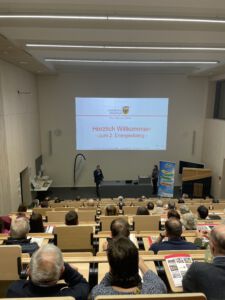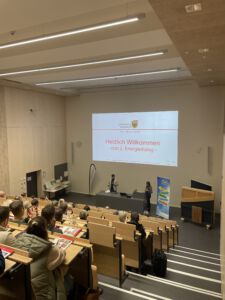Second Energy Dialogue of the district of Ansbach at the Feuchtwangen Energy Campus
Campus team shows sustainable roof and facade insulation
Around half of the buildings in the district of Ansbach date back to before 1971 – an enormous potential for energy-efficient renovations. So it’s no wonder that the second Ansbach district energy dialog, which recently took place at the Feuchtwangen Energy Campus, was very well received. Organized by the district’s climate protection management, the event attracted numerous building owners, energy experts and municipal representatives who wanted to find out about innovative refurbishment approaches and current funding opportunities.
After being welcomed by Mayor Patrick Ruh, District Administrator Dr. Jürgen Ludwig and Campus Director Prof. Dr. Haresh Vaidya, participants had the opportunity to choose from two one-hour specialist presentations, ask questions to experts and exchange ideas with each other. The variety of topics offered each participant valuable insights and practical tips.
In his presentation, Wolfgang Dießl, energy consultant, addressed common questions he is asked by homeowners. In addition to information on eligible costs and subsidy programs, he showed how operating and heating costs can be reduced through targeted measures.
Another important area was covered by Robert Sturm, energy consultant from the Bavarian consumer advice center.In his presentation on modern windows and doors, he explained how the maintenance of older windows, window upgrades and window replacements can improve thermal insulation, increase living comfort and enhance security.
The Campus also made an active contribution to the event with a presentation on sustainable roof and façade insulation. Dr. Gerd Hofmann provided a comprehensive overview of the importance of modern insulation technologies. He emphasized that sustainable insulation goes far beyond simply saving energy: “It is important to consider the entire life cycle of a material – from production to dismantling and recycling.”
Sustainability can only be achieved if these aspects are also taken into account.
Dipl.-Ing. Oliver Abel then presented the online tool Ubakus, which enables building owners and planners to analyze various insulation materials in detail.
The tool can be used to evaluate not only thermal and energy effects, but also the impact of the materials on CO₂ emissions and the carbon footprint. Abel used real examples to demonstrate how ecological insulation materials such as wood fiber boards or cellulose are superior to conventional materials in many respects – both in terms of their energy balance and their sustainability. “With Ubakus, well-founded decisions can be made that simultaneously reduce heating costs and protect the climate,” explained Abel.
The event ended with consistently positive feedback. Lena Navarro Ortiz, the district’s climate protection manager and organizer of the Energy Dialogue, was satisfied: “We were able to provide the participants with a wide range of specialist knowledge and tips.”
The Energy Dialogue in Feuchtwangen once again made it clear how important specialist knowledge and practical assistance are in order to promote sustainable and future-proof building renovations.


